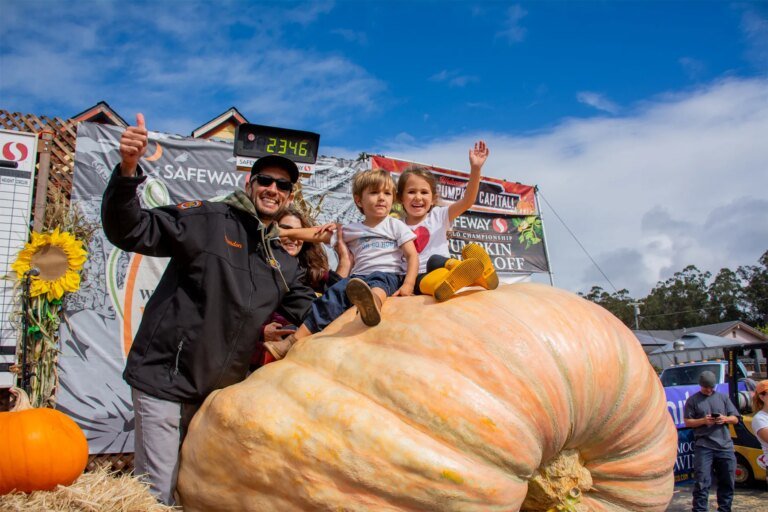The pumpkin’s name was Muggle and it weighed as much as a bull moose. At 2,819 pounds and over 21 feet in circumference, this enormous gourd claimed the dual titles of “heaviest pumpkin” and “largest pumpkin by circumference” in the Guiness Book of World Records on October 4, 2025.
For British twins Ian and Stuart Paton, it’s a hard fought victory 51 years in the making. “When we were 13, we were given some seeds,” Ian Paton says. “One of them grew into a 54-pound pumpkin and that was it. Once you grow one, you get pumpkin sickness.”
Several of the twins’ pumpkins, many of which are named for Harry Potter characters like Hagrid, have come painfully close over the years. In 2022, they nabbed the title of heaviest pumpkin in the UK—an honor, to be sure, but not quite on par with beating the Americans for world pumpkin domination. One might think that decades of near misses would put anyone off the giant pumpkin game for good. Yet the Patons never considered stopping. Even now, although Stuart has said he will retire after this year, Ian plans to keep going.
“I think it’s just the sheer size—these things grow to the size of a small car,” he says. “It’s like James and the Giant Peach. You plant the seed and you produce a monster.”
Today, “pumpkin sickness” is a global affliction, although its roots are very much American. In 1992, the Great Pumpkin Commonwealth was founded in Indiana as a kind governing body of the world of giant fruits and vegetables. Although pumpkins are their raison d’être, they also preside over watermelons, tomatoes, and long gourds. Today, it oversees more than 70 officially sanctioned giant pumpkin weigh-off sites from as far away as South Africa, Japan, and Australia. The competition is fierce, the stakes high and often lucrative. But there’s a real science behind growing gourds of unusual size, and a little bit of luck, too.
A brief history of giant pumpkins
Growers duking it out over giant vegetables is nothing new. The Western Alaska State Fair has been holding monster cabbage weigh-offs since the 1920s. The Half Moon Bay Pumpkin Festival Contest—the ultimate crown in the giant pumpkin world—first started back in 1974. Back then, the champion was a measly 132 pounds, a figure that has grown exponentially since.

“At one point, no one thought we’d ever have a one-ton pumpkin, but we got there, and we’re going beyond it,” says Steve Reiners, a professor at the School of Integrative Plant Science at Cornell AgriTech. In 2012, Ron Wallace from Rhode Island smashed through the pumpkin glass ceiling with a specimen weighing 2,009 pounds. Since then, pumpkins have reached Brobdingnagian proportions, with the 3,000-pound threshold growing steadily closer.
“I read some years back that some engineer came up with the figure that he thinks they could get close to 20,000 pounds before it would just collapse in on itself,” Reiner says. The exterior of a giant pumpkin is often a foot thick and tough enough you’d need a chainsaw to get through it. “I think what’s limiting us now is the season. You’ve only got so much time to grow this.”
Muggle, the Paton twins’ pumpkin, grew from a seed to the size of Cinderella’s carriage in a mere 131 days.
It all starts with a seed
As with many world record-smashers before it, the Patons’ prize pumpkin was an Atlantic Giant, a variety of Cucurbita maxima first developed in the 1970s. The seeds for these behemoths are only slightly larger than that of a regular jack o’ lantern, and they grow at alarming speeds. Once the plants get going, the vines sprawl a foot a day in every direction. Early on, the grower must choose his or her fighter from the baby pumpkins on the vine. By culling the smaller ones, they force the plant to focus all of its energy on one.
“Our pumpkins can grow 70 pounds a day, so 700 pounds in 10 days,” Paton says with pride, then adds slyly, “People say what do you feed them and I say, ‘A small child everyday!’”
Jokes aside, pumpkin-growers feed these monstrosities an alarming amount of water—in the case of the Patons’ pumpkins, about 130 gallons a day. “They’re thirsty,” Paton says. “They need no more fertilizer [per square foot] than your normal tomato plant would—just bulked up, since it’s about 1,200 times your tomato plant.”
Related Hobby Stories
Although growing giant pumpkins is certainly an art, the champions insist that there’s no real magic bullet or secrets to it. Travis Gienger, a horticulture teacher at Anoka Technical College in Minnesota, attributes his success to genetics, patience, and careful plant-management techniques. Each year, he carefully hand-pollinates his plants to combine the genes of the pumpkin with a large circumference with a pumpkin with an exceptionally thick shell.
“You need a thick shell to win,” Gienger says, citing the fact that champions are usually ranked on weight. He would know. A four-time winner of the Half Moon Bay Pumpkin Festival Contest, Gienger set the North American record in 2022. In 2023, his 2,749-pound goliath nicknamed Michael Jordan set the previous world record.
Like the Patons, Gienger has been obsessed for almost his entire life. “My dad was raising little pumpkins, say, maybe 100-pounders that we put in a wheelbarrow as a kid,” he says. “Then I went to the state fair and saw some big ones, and I’m like, ‘I wonder if I can do that.’ Nearly three decades later, I had the world record.”
Gourd glory and riches
The road to pumpkin fame and fortune is fraught with peril. A single, tiny hole in the side of Gienger’s prospective entry this year allowed air to enter the main cavity. The entire gourd rotted. “There’s a lot of factors that are out of your control,” Gienger says. “Weather, obviously, the big one. If we get smoked with rain, that’s no good. If we’re too hot or too cold, too cold is usually the problem around here. Halestorms, that’s your enemy.”

Even once the pumpkins make it to maturity, there are still hurdles to cross. Just hoisting a 2000-plus-pound fruit requires a special harness. Last year, Gienger drove his winning pumpkin more than 2,000 miles over 35 hours to California for the weigh-off. After the contest, it had to journey all the way to New York, where it took three growers five days to hack it apart.
It was all worth it though. A single seed from Michael Jordan goes for $349. Gienger also took home $30,000, plus a weekend at The Ritz-Carlton in Half Moon Bay. “It’s a pretty sweet deal,” he says. “You get a coat and an engraved ring. And they put you on a pumpkin float for the big parade.”
For most growers, the pride of winning far outweighs the cash. As Paton points out, it costs a small fortune just to grow these pumpkins. “We call it the friendliest sport in the world, because we all help each other out,” Paton says. “Ultimately, your competition is yourself. A battle of wits against Mother Nature.”
For decades, Popular Science has highlighted the work of hobbyists. If you or someone you know is a DIY hobbyist working on a project, we’d like an introduction. Fill out this form and tell us more.



